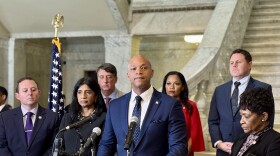The Maryland Senate gave final passage Tuesday to a state budget package that closes a roughly $3.3 billion deficit and adds about $1.5 billion in new taxes.
This has been a particularly tough budgeting year for lawmakers, as they grappled with how to close the large structural deficit and to safeguard against uncertainty surrounding federal government spending cuts.
Republican lawmakers criticized Democratic leaders for relying too heavily on tax increases and not enough on cuts to existing programs to balance the budget.
Among the more controversial proposals is a 3% tax on certain data and technology services.
The package creates two new tax brackets for top earners. Income between $500,000 and $1 million will be taxed at 6.25%, while income over $1 million will be taxed at 6.5%. Currently, Maryland taxes all income above $250,000 at 5.75%.
Other new taxes include a 6% sales tax on vending machine purchases and increases in taxes on cannabis and sports betting. The Senate version of the budget also includes a new fee on tire purchases, $5 per tire.
If the Senate “had a couple of tax increases that were going up and said, hey, look, we're plugging a couple hundred million dollars because we just couldn't get all the way there, that might be one thing, honestly,” Senate Minority Whip Justin Ready, whose district includes parts of Carroll and Frederick counties, said Tuesday.
But, he said, the package’s $1.5 billion in new taxes and fees go too far.
“We cannot continue to go back to the taxpayers again and again,” he said. “It's going to cost us in this state in losing talent, treasure, and frankly, we're losing our culture. Lot of people leaving.”
On the other hand, Sen. Craig Zucker, a Montgomery County Democrat, highlighted some of the things the budget funds — $29 million for the Eastern Shore Hospital Center, $121 million for “men and women in public safety,” and hundreds of millions of dollars for services provided by the Developmental Disabilities Administration.
The Senate’s budget decisions reflect lawmakers’ values, said Senate President Bill Ferguson.
“We could kick 15,000 kids off Medicaid. We could shut down our psychiatric hospitals. We could pull back money from law enforcement and public safety. We could stop doing things to protect the Chesapeake Bay,” Ferguson told reporters. “All of those are options, and we just feel like the better approach is a balanced approach.”
Even with the Senate passage, the budget is not a done deal. House and Senate leaders need to reconcile differences in their respective versions. Those negotiations are expected to begin as early as Wednesday.
The General Assembly’s annual 90-day session ends Monday night at midnight.







